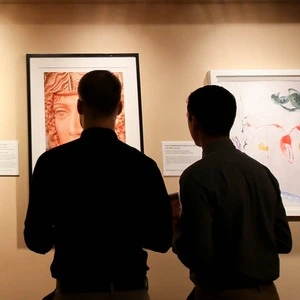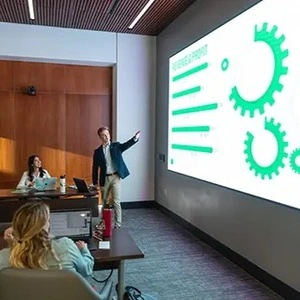
Enroll Anytime Math and Science courses
Course Titles
BIMD 220: Human Anatomy & Physiology I
BIMD 220 (3 credits) and BIMD 221 (3 credits) together are a complete survey of the anatomy and physiology of the major human organ systems and the foundational concepts required to understand them. BIMD 220 covers beginner material on introductory AP, cells, and tissues, as well as advancing through the skin, skeletal, muscle and nervous organ systems.
BIMD 220L: Human Anatomy & Physiology I Lab
Laboratory to accompany BIMD 220.
BIMD 221: Human Anatomy & Physiology II
BIMD 220 (3 credits) and BIMD 221 (3 credits) together are a complete survey of the anatomy and physiology of the major human organ systems and the foundational concepts required to understand them. BIMD 221 is a more advanced study of the endocrine, lymphatic, cardiovascular, respiratory, digestive, urinary, and reproductive systems.
BIMD 221L: Human Anatomy & Physiology II Lab
Laboratory to accompany BIMD 221.
CHEM 115: Introductory Chemistry
Measurement, ionic and covalent compounds, chemical calculations, states of matter; energy, solutions, reactions, chemical bonding.
CHEM 115L: Introductory Chemistry Lab
Laboratory to accompany CHEM 115.
CHEM 116: Introduction to Organic and Biochemistry
A second semester of general chemistry with emphasis on organic and biochemistry. Includes alkanes, alkenes, alkynes, aromatics, alcohol, phenols, ethers, aldehydes, ketones, carboxylic acids, esters, amines, amides, carbohydrates, lipids, amino acids, proteins, and nucleic acids. Required of students in the B.S. in Chemistry program. Does not satisfy the prerequisite for any advanced chemistry course.
CHEM 116L: Introduction to Organic and Biochemistry Lab
Laboratory to accompany CHEM 116.
CHEM 121: General Chemistry I
Open to all students; no high school credit in chemistry required. Elementary principles and theories of chemistry; matter, measurement, atoms, ions, molecules, reactions, chemical calculations, thermochemistry, bonding, molecular geometry, periodicity, gases.
CHEM 121L: General Chemistry I Laboratory
Laboratory to accompany CHEM 121.
CHEM 122: General Chemistry II
Elementary principles and theories of chemistry; Intermolecular forces, liquids, solids, kinetics, equilibria, acids and bases. Solution of chemistry, precipitation, thermodynamics, electrochemistry.
CHEM 122L: General Chemistry II Laboratory
Laboratory to accompany CHEM 122.
ECON 210: Introduction to Business and Economic Statistics
Descriptive statistics; probability; discrete and continuous probability distributions; sampling distributions; estimation and hypothesis testing of common parameters; analysis of variance; correlation; linear regression.
EFR 515: Statistics I
An introduction to basic statistical methods, focusing primarily on descriptive statistics and inferential statistics up to and including two-way analysis of variance.
GEOL 101: Introduction to Geology
Introduction to the dynamics of the Earth -- volcanoes, earthquakes, plate tectonics, streams, groundwater, glaciers, waves, wind, and landslides, with emphasis on the environmental applications of these processes. Introduction to the tools of the geologist -- minerals, rocks, maps, and aerial photographs.
GEOL 101L: Introduction to Geology Lab
An introductory laboratory to complement GEOL 101.
MATH 103: College Algebra
Relations and functions, equations and inequalities, complex numbers; polynomial, rational, exponential and logarithmic functions, systems of equations, applications, and quantitative reasoning.
MATH 105: Trigonometry
Angles, trigonometric functions and their inverses, solving triangles, trigonometric identities.
MATH 107: Precalculus
Equations and inequalities; polynomial rational, exponential, logarithmic and trigonometric functions; inverse trigonometric functions; algebraic and trigonometric methods commonly needed in calculus.
MATH 146: Applied Calculus I
A non-rigorous introduction to differential and integral calculus. Topics include limits, continuity, differentiation and integration techniques, and applications.
MATH 165: Calculus I
Limits, continuity, differentiation, Mean Value Theorem, integration, Fundamental Theorem of Calculus.
MATH 166: Calculus II
Techniques and applications of integration, exponential and logarithmic functions, parametric equations, infinite sequences and series.
MATH 207: Introduction to Linear Algebra
A computational treatment of systems of linear equations, finite dimensional vector spaces, linear transformations, determinants, matrices, eigenvalues, eigenvectors, and diagonalizability.
MATH 208: Discrete Mathematics
Introduction to Set Theory, Functions and Relations, Permutations and Combinations, Logic, Boolean Algebra, Induction, Difference Equations. Other topics from Graphs, Finite Automata and Formal Languages.
MATH 265: Calculus III
Multivariate and vector calculus including partial derivatives, multiple integration, line and surface integrals, Green's Theorem, Stokes' Theorem, the Divergence Theorem.
MATH 266: Elementary Differential Equations
Solution of elementary differential equations by elementary techniques. Laplace transforms, introduction to matrix theory and systems of differential equations.
N&D 240: Fundamentals of Nutrition
This introductory course focuses on basic elements of nutrition science. Emphasis is placed on nutrients, their functions and food sources, and discussion about how food behavior translates into nutritional health. The course also includes current topics such as fad diets, phytochemicals, and sports nutrition. Students learn to apply the principles of nutrition to their own food intake to improve their nutritional health.
OT 200: Introduction to Occupational Therapy
History, scope, objectives, and functions of Occupational Therapy.
PHE 306: Epidemiology and Biostatistics
The purpose of this course is to provide the students the historical perspectives of health and health education; professional issues and ethics; credentialing; principles, practices, theoretical frameworks, and foundations of health education.
PHIL 250: Ethics in Engineering and Science
This course centers on the ethical issues of particular concern to both citizens and professionals involved in engineering and related technical/scientific fields. We review ethical history and ethical theory in all class discussions. The major focus of the course, however, is on ethical dilemmas, case studies, and codes relevant to contemporary engineering and scientific practice.
PHYS 110: Introductory Astronomy
An introductory study of the universe: The solar system, stars, stellar evolution, galaxies, black holes, big bang cosmology, and the accelerating universe.
PSYC 241: Statistics for the Behavioral Sciences
This course will introduce you to descriptive and inferential statistics as applied to psychological measurement and experimentation.
Find Your Self-Paced Enroll Anytime Course
Why Take Online Classes at UND?
Here are a few reasons why you should take an online enroll anytime course at UND:
- Great customer service – Our registration team is ready to answer questions quickly so you can focus on your coursework.
- Affordable – UND's enroll anytime courses are priced at North Dakota's affordable, in-state tuition rate.
- Accredited – UND is accredited by the Higher Learning Commission.
- Easily transfer credits – Transferring credits is always at the discretion of the institution to which the credits are being transferred. In general, credits from schools/universities that are regionally accredited by the Higher Learning Commission transfer to other regionally accredited institutions. UND's online courses appear on your UND transcript in the same way as other courses.
Flexible 100% Online Course
You'll take this online course at your own pace. Some students thrive in this environment, while other students may struggle with setting their own deadlines. If you have successfully taken an independent study or correspondence course previously, UND’s enroll anytime courses may be right for you. Still not sure? Take our online quiz to help determine if online enroll anytime courses are right for you.
Course information including tuition, technology requirements, textbooks, lessons and exams is subject to change without notice.
How will the course appear on my transcript?
You may enroll at any time and have up to 9 months to complete this online course.
The credits earned will be recorded on your UND transcript based on the date you registered
for the course. It will appear on your transcript in the same way as a course taken
during a regular semester. There is no indication that the course was taken online
or that you completed it at your own pace.
Consult the table on our How Enroll Anytime Courses Work page for a current listing of Enroll Anytime Registration Dates and the semester
information that will appear on a UND transcript.




